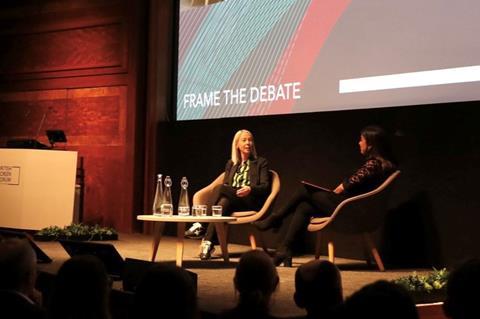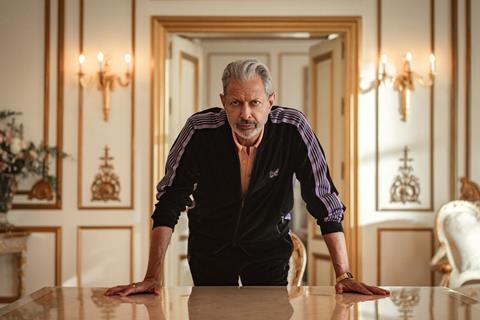
Jane Featherstone, co-founder and chief creative officer at UK high-end TV production company Sister, said she senses the TV market is shifting back to days of old, with big budget shows featuring Hollywood talent on the way out, and comfortable, long-form returning series making a comeback.
“We’re back to where we were. The names have changed, but everything feels like we’re reversing, not necessarily in a bad or a good way,” said Featherstone, during an on-stage conversation at the British Screen Forum, held yesterday (November 21) in London. She has been in the industry for around 30 years, with credits ranging from ITV crime drama Broadchurch to HBO mini-series Chernobyl.
Four or five years ago, at the height of the US streamer “wars”, it felt like a halcyon period for big budget TV shows, said Featherstone. “We all knew in our hearts it was a bubble, and we were all prepared to take the shilling at the time,” said Featherstone. ”I think deep down we all knew there was going to be a crash, and the last two years for producers there has been a crash. We’re now feeling at crisis point.”
Budgets have gone up by between a third or even a half compared to four years ago, acknowledged Featherstone, and streamers have turned to advertising-based models. Featherstone believes these advertisers don’t want risky shows, but dependable, long-running series they know viewers will turn out for. “Long-running, network-style shows – Suits has been a massive hit on Netflix, they will be commissioning those more and more. Hustle in the UK, Spooks, those [shows] that 15, 20 years ago were mainstays of the schedule.”
Featherstone said she believed this will impact the type of talent drawn to TV, after Hollywood A-listers have increasingly turned to TV work in the droves in the past decade.
“The need for mainstream television means they can’t afford those movie stars, for 10 or 12 episodes. Very often, the movie stars don’t want to do a TV schedule. We need to start creating our own TV stars because it’s cheaper, and that’s the ecology… I also think agents and talent are going to have to take a haircut.”
While Sister has recently produced a series for Netflix, Black Doves, starring Keira Knightly, Featherstone said she doesn’t believe big film stars are what brings audiences into TV. However, distributors don’t necessarily agree. “It’s really hard when you’re trying to work with a buyer, and they can’t find any other criteria,” said Featherstone.

Sister also recently produced Kaos, a high-budget Netflix series starring Jeff Goldlum as Zeus. It was cancelled after one season, despite buzz around it.
“I was very proud of [Kaos], but it came and went very quickly, because it all dropped, and it was in the top 10 for a few weeks, and then it sort of goes, it doesn’t get that long tail… The reason for that [cancellation], and we’ll say it ourselves, it was a very expensive show. It was distinctive and unusual for Netflix and where [Netflix] sits now with a more mainstream audiences. For it to reach a big enough audience globally and be worth the cost, it was going to be a very high ask.”
Featherstone welcomed the news Channel 4 has upped its budget for scripted. In August, the UK public service broadcaster announced it is doubling its drama budget, under recently-appointed C4 drama and Film4 head Ollie Madden. “The truth is, Channel 4 has wanted a couple of things we have been out pitching, but they couldn’t afford it,” she said.
Featherstone is on a mission to “make mainstream fashionable again… I think we’ve become a bit snotty. We all loved Succession, but nobody watched it really. It had tiny viewing figures.”
She continued: “We have to try to retain the younger writers who grew up with HBO, thinking that’s everything. We have to broaden that a little bit – Inspector Morse, Cracker, there is something very valuable in us trying to reach mass audiences with something very high quality.”
She also anticipates that streamers are moving towards more of a form of traditional scheduling, echoing linear broadcasting, with their shift into sport and live event broadcast.
US influx
Featherstone spoke of intel she gathered from a trip to LA last week, having meetings with studios about high-end TV projects. “They’re [US studios] coming here [to the UK]. They’re going to come here and spend more money.”
She noted the Independent Film Tax Credit for UK-qualifying features with qualifying expenditure under £15m as “brilliant” progress for the UK indie film sector, however, she feels measures need to be in place to protect UK high-end TV producers.
“It’s [US investment] great for jobs, but it’s not great for building a sustainable business model here. We need to look at how the tax break is applied. Should there be a sliding scale, applied to domestic programming? Should there be a quota, as with France?”
Tackling AI
While Sister has not fully got its head around AI, currently only using it for internal presentations, Featherstone believes it’s important not to bury one’s head in the sand about it. The production company has a working group to try to understand how it could be used in a way that doesn’t supersede human creativity.
“AI is something we have to be very alert to, and not afraid of,” she said. She also defended ITV for a job advert it posted last month, looking for a head of generative AI, that prompted backlash from screenwriters and content creators. “I really respect that they’re trying to understand it and get on top of it. We dip our heads in the sand, we’re lost.”
Featherstone also believes producers need to engage more fully with YouTube and social media content creators, who know how to speak to young audiences.
“Try and employ young people. As a producer, I haven’t worked out how to engage with that community, and if we don’t, we’ll die.”

























No comments yet